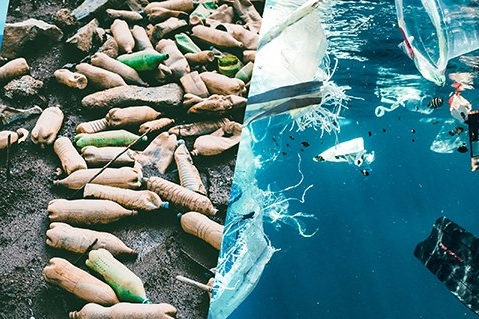
Researchers from Chalmers University discovers plastic-eating enzymes
YarnsandFibers News Bureau 2022-01-06 09:48:15 – SwedenAccording to a new study from Chalmers University in Sweden, microbes are emerging around the world to consume plastic pollution.
The research, which was recently published in the scientific journal mBIO, looked at environmental DNA samples from hundreds of different locations throughout the world. The researchers searched for microbial enzymes with plastic-degrading capability using computer modeling, which was then compared to official figures for plastic waste pollution across countries and oceans.
Aleksej Zelezniak, associate professor in systems biology at Chalmers, said that they discovered multiple lines of evidence using their models supporting the fact that the global microbiome's plastic-degrading potential correlates strongly with measurements of environmental plastic pollution – a significant demonstration of how the environment is responding to the pressures they are putting on it.
Over 30,000 enzyme 'homologues' with the ability to break down ten distinct types of regularly used plastics were discovered in total. Homologues are protein sequences that have comparable characteristics. Some of the regions with the greatest concentrations were notoriously polluted areas, such as the Mediterranean Sea and the South Pacific Ocean.
Plastic mass production, which includes synthetic fibers, has increased from roughly 2 million tonnes per year to around 380 million tonnes in the last 70 years or more. This has provided enough evolutionary time for diverse bacteria in the environment to respond to these substances, and numerous distinct enzymes capable of degrading various plastics have been found in earlier investigations.
Jan Zrimec, the study's first author and former post-doc in Aleksej Zelezniak's lab, who is now a researcher at Slovenia's National Institute of Biology, said that they did not expect to find such a huge number of them across so many different bacteria and environmental habitats. This is a startling revelation that demonstrates the scope of the problem.
Approximately eight million tonnes of plastic enter the world's waters every year. Plastic disintegration takes a long time to occur naturally - a PET bottle, for example, can persist for hundreds of years. Plastic waste accumulation in the oceans and on land is a genuinely global issue, and there is a rising need for waste management solutions. The findings could be used to find and adapt enzymes for new recycling processes, according to the researchers.
Zelezniak added that the next step would be to examine the most promising enzyme candidates in the lab to learn more about their capabilities and the rate at which they can degrade plastic. From there, you could create microbial communities with specialized polymer-degrading capabilities.
Market Intelligence
Ask for free sample Report

experience
Customer Base
dedicated team
Countries Served Worldwide









